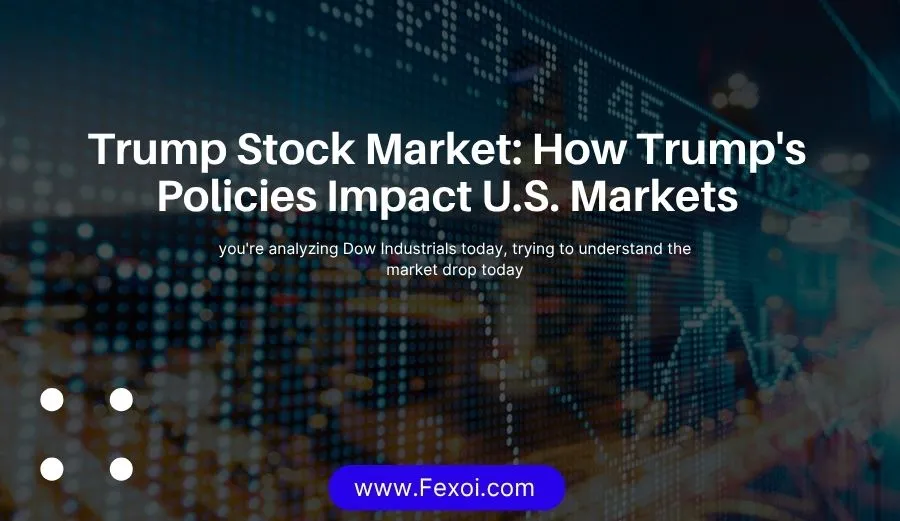The term “Trump stock market” refers to how U.S. markets have responded during Trump’s political presence. financial markets during Donald Trump’s presidency and beyond, including the lingering effects of his economic and political actions. Whether you’re analyzing Dow Industrials today, trying to understand the market drop today, or wondering why stocks are falling today, it’s hard to ignore the outsized impact Trump has had on investor sentiment, policy-making, and Wall Street volatility.
Trump’s Market Legacy: Key Policies That Influenced Wall Street
Donald Trump’s economic policies often sent ripples—sometimes waves—through the stock market. Here’s a look at some of his most impactful moves.
Corporate Tax Cuts and Deregulation
One of Trump’s signature achievements was the Tax Cuts and Jobs Act of 2017, which slashed the corporate tax rate from 35% to 21%. This move dramatically boosted corporate earnings and led to widespread stock buybacks, particularly among Fortune 500 companies. Wall Street responded positively, with major indexes like the S&P 500 and the Dow Industrials posting strong gains in the months following the legislation.
On the deregulation front, Trump rolled back numerous Obama-era rules, especially in the banking, energy, and healthcare sectors. The financial sector welcomed these changes, viewing them as a green light for more aggressive lending and investment strategies.
Trade Wars and Tariffs
Trump’s “America First” approach led to trade tensions, especially with China. His administration imposed tariffs on billions of dollars’ worth of goods, prompting retaliatory tariffs and market anxiety. These trade wars contributed to global supply chain disruptions and periodic market sell-offs. Many investors found themselves refreshing news feeds to understand the market drop today or why stocks are falling today, often due to escalating tariff threats.
Despite these headwinds, Trump argued that such measures were necessary to protect U.S. manufacturing and reduce trade deficits a point that resonated with a portion of the investor base.
Infrastructure and Defense Spending
Trump frequently pushed for increased spending on infrastructure and defense, both of which gave a boost to sectors like construction, steel, and aerospace. While a major infrastructure package never fully materialized during his first term, the defense sector saw budget increases, which benefited contractors like Lockheed Martin and Raytheon. Stocks in these industries generally outperformed broader market benchmarks during his presidency.
Under Trump Stock Market Trends : What the Data Shows
So how did the Trump stock market actually perform? Let’s examine the numbers.
S&P 500 and Dow Industrials Performance
Between Trump’s inauguration in January 2017 and the start of the COVID-19 pandemic in early 2020, the S&P 500 rose approximately 45%, and the Dow Industrials climbed over 50%. These gains were bolstered by strong corporate earnings, business-friendly tax reforms, and low unemployment rates.
However, markets also experienced notable volatility:
- December 2018 saw a steep correction due to fears of Fed rate hikes and trade tensions.
- March 2020, amid the onset of COVID-19, triggered one of the fastest bear markets in U.S. history.
Despite these downturns, the market staged a rapid recovery thanks to fiscal stimulus and interest rate cuts. By the end of Trump’s term, the Dow had set several all-time highs, contributing to the “Trump rally” narrative.
Comparison With Other Presidential Terms
Compared to previous administrations, Trump stock market performance was impressive in terms of raw percentage growth. However, it’s important to contextualize this:
- Barack Obama inherited a financial crisis, and the markets nearly tripled during his eight-year tenure.
- George W. Bush saw a net decline in markets due to the dot-com bubble and the 2008 financial crisis.
- Trump stock market, while volatile, was marked by strong returns—particularly in tech, financials, and industrials—thanks to a mix of policy tailwinds and bullish investor sentiment.
Why the Trump Stock Market Reacts to News
Trump Stock Market influence on the market didn’t end with his presidency. His social media posts, legal challenges, and political ambitions continue to sway investor sentiment.
Political Uncertainty and Investor Sentiment
Markets thrive on predictability and Trump rarely delivered that. Whether it was an unexpected policy shift, a tweet about trade, or legal drama, the Trump stock market was constantly shaped by political headlines. Uncertainty tends to make investors nervous, which can trigger dips or spikes depending on the nature of the news.
Social Media and Policy Announcements
No other U.S. president has influenced the markets through social media as directly and frequently as Trump. His tweets had the power to move the Dow Industrials today by hundreds of points. Announcements about tariffs, corporate criticism, or even praise for companies could shift share prices within minutes.
Trump-Linked Companies and Meme Stock Behavior
Companies associated with Trump—whether through direct ties, partnerships, or mere speculation—have shown meme-stock tendencies. This behavior became more pronounced after his presidency, especially among retail traders on platforms like Reddit and X (formerly Twitter). Speculative trading often leads to quick market surges followed by sharp pullbacks, a pattern seen in several Trump-linked stocks.
Trump Media & Technology Group (DJT): A Closer Look
Trump Media & Technology Group, trading under the ticker symbol DJT, remains one of the most closely followed Trump-linked stocks in the market.
Stock Performance Overview: Dow Industrials Today Reference
Though not a component of the Dow Industrials, DJT’s performance often becomes part of broader discussions about market movements. Its price swings frequently mirror public sentiment about Trump’s political future and legal circumstances.
For example:
- News of indictments has led to sudden drops.
- Announcements about new platform features or partnerships often spark brief rallies.
- DJT has shown high volatility, making it a favorite among short-term retail traders.
Controversies, Volatility, and Retail Interest
The company’s flagship product, Truth Social, aims to rival platforms like Twitter. However, it has struggled to gain mainstream traction. Analysts remain divided—some believe the stock is overhyped and driven by sentiment rather than fundamentals, while others argue it offers long-term potential if Trump regains political power.
Retail interest remains strong, with DJT frequently appearing on “most traded” lists despite lacking the fundamentals typically favored by institutional investors.
Analyst Opinions and Future Outlook
Wall Street analysts have issued mixed reviews:
- Bearish View: DJT’s valuation is inflated, profitability remains elusive, and regulatory concerns loom.
- Bullish View: The Trump brand remains powerful, and any political comeback could inject renewed enthusiasm into the company’s prospects.
Investors are advised to watch the Dow Industrials today and overall tech market performance to gauge sentiment spillover from DJT and similar speculative plays.
Why Stocks Are Falling Today: Is Trump Involved?
Market volatility is a constant concern for investors, and many are now asking: why are stocks falling today, and is former President Donald Trump in any way connected to the latest market drop? The answer isn’t always black and white, but Trump stock market both during his presidency and after—remains significant.
Recent Market Drops Explained
Stock markets are influenced by a wide range of factors, including inflation data, employment reports, interest rate decisions, and global tensions. Recently, concerns about sticky inflation and speculation about the Federal Reserve’s interest rate policy have triggered declines in major indices, including the Dow Industrials today.
However, political news can amplify or even trigger market sell-offs. Whether it’s an indictment, a controversial policy remark, or speculation surrounding the 2024 election, headlines involving Trump often coincide with a spike in volatility.
Is There a Link to Trump-Related News or Companies?
Yes especially with the public listing of Trump Media & Technology Group (DJT). Whenever DJT stock experiences dramatic movement, it tends to generate media buzz and retail investor reactions, which can spill over into broader sentiment. Additionally, Trump’s legal and political controversies often cause fluctuations in defense, energy, and tech stocks, especially if his comments hint at potential policy shifts.
Investors tend to react swiftly to any hint that Trump might influence tax policies, trade strategies, or corporate regulation again—just as they did during his presidency.
Broader Economic Factors and Federal Reserve Influence
Despite Trump’s relevance, most recent downturns are primarily rooted in macroeconomic concerns. The Federal Reserve’s tight monetary policy, in response to inflation, plays a dominant role. The possibility of delayed interest rate cuts and weak earnings from major companies are also weighing down sentiment.
That said, when Trump enters the news cycle especially around legal proceedings or campaign trail rhetoric—markets often react sharply, suggesting his influence still lingers heavily over Wall Street.
Investor Tips: Navigating Volatility in the Trump Stock Market Era
Political uncertainty and economic change often go hand in hand. For retail and institutional investors, navigating the Trump stock market means preparing for heightened volatility, driven by news headlines more than ever.
Diversification Strategies
Don’t put all your eggs in one political basket. Diversifying across industries, asset classes, and even geographic regions is a sound approach. While DJT and other politically linked stocks may offer explosive growth, they can also crash without warning. Balanced portfolios with exposure to defensive sectors like utilities, healthcare, and consumer staples can help weather political storms.
Risk Management Amid Political Uncertainty
Use stop-loss orders, monitor market sentiment tools, and avoid speculative moves based solely on political developments. Whether it’s a market drop today or a surge tomorrow, reactionary trading without a strategy is a recipe for loss. Volatility isn’t inherently bad—it can offer entry points for long-term investors.
Tools to Monitor Market Drop Today and Forecast Change
Use financial platforms like Bloomberg, Yahoo Finance, or TradingView to monitor real-time data. Leverage heat maps, sector performance trackers, and sentiment analysis tools. Apps like Seeking Alpha or Finviz can help forecast political impact on stocks, and platforms such as CNBC provide daily commentary that often links market shifts to Trump-related developments.
Expert Insight:
Financial experts are divided, but most agree on one point: Trump moves markets.
“Regardless of your political stance, the Trump era introduced a new level of stock market sensitivity to presidential statements,” says Matthew Klein, a senior market strategist. “Investors are learning to expect the unexpected.”
This market behavior began during his presidency, when a single tweet could send stocks soaring or tumbling. Now, as the 2024 election approaches, analysts warn that his return to the spotlight could once again impact industries like defense, energy, social media, and even crypto.
Additionally, any changes to tariffs, taxes, or healthcare policy under a potential Trump administration could have lasting market consequences.
FAQs About the Trump Stock Market
Why does the stock market react to Trump news?
Trump remains a polarizing figure with significant influence. Whether it’s policy-related or personal news, markets react because investors anticipate future implications for business regulation, taxes, and global trade.
What happened to the Dow Industrials today and why?
The Dow Industrials today experienced a dip due to mixed earnings reports and uncertainty around interest rate decisions. However, a Trump-related media spike around DJT or campaign rhetoric can quickly become a parallel factor.
Why are stocks falling today is it political?
Partially. While economic data like inflation and jobs reports are usually the primary causes, political instability and speculation especially involving Trump can amplify losses.
Should I invest in Trump Media stock (DJT)?
DJT has gained attention as a “meme stock” tied to Trump supporters and retail traders. While it offers the potential for short-term gains, the stock is extremely volatile and may not be suitable for conservative, long-term portfolios. Always conduct thorough research and consider your risk tolerance before investing.
Conclusion: What Investors Should Know Moving Forward
Navigating the Trump stock market requires more than just political awareness—it demands strategic investing, risk discipline, and a long-term view.
Key Takeaways:
- Trump’s influence still shakes the market—even post-presidency.
- DJT and similar stocks are volatile and speculative.
- Macroeconomic factors remain more impactful in the long run.
- Diversification and real-time market tracking are your best defenses.
Market Outlook Post-Trump
Even if Trump is not re-elected, his media presence and corporate interests (like Trump Media) will likely continue to influence trading behavior. His policies, endorsements, and statements—especially if he remains active in politics—will keep Wall Street on edge.
What to Watch for in Upcoming Elections
Investors should monitor debates, campaign promises, and polling data closely. Healthcare, tech regulation, defense, and green energy are sectors most likely to be influenced by Trump-aligned policy shifts.
If Trump returns to power, expect renewed volatility but also new opportunities.







